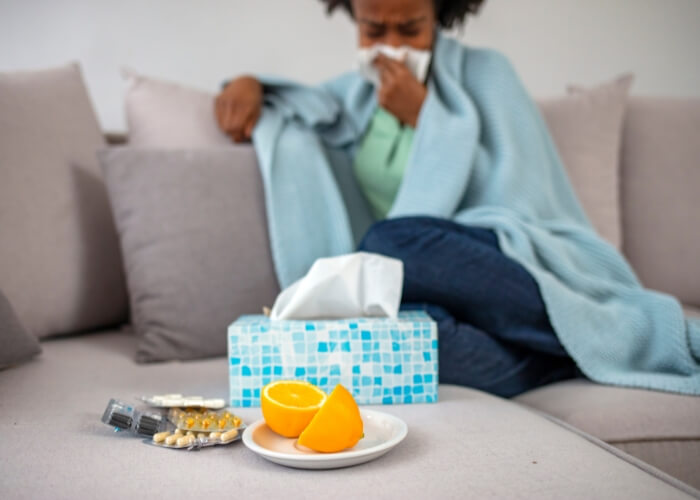The seasonal flu is a highly contagious viral infection that affects millions of people worldwide each year. It can cause a range of symptoms, including fever, chills, cough, sore throat, muscle aches, and fatigue. In severe cases, it can lead to complications such as pneumonia, hospitalization, and even death. As the seasons change, it’s important to take steps to protect yourself and those around you from the flu.
In this blog, we’ll share swift tips for preventing and protecting yourself from the seasonal flu. We’ll also introduce you to a new and effective tool for flu prevention and treatment: Flu Short. Developed by a team of scientists and medical professionals, Flu Short is a nasal spray that can reduce the risk of flu infection and help alleviate symptoms if you do get sick.
In addition to exploring the benefits of Flu Short, we’ll discuss other strategies for staying safe during flu season. These may include getting a flu vaccine, practicing good hygiene, and avoiding close contact with people who are sick. By following these simple steps, you can minimize your risk of catching the flu and protect yourself and your loved ones from this potentially dangerous illness. So let’s dive in and discover how you can stay healthy and flu-free all year round!
Understanding the Seasonal Flu: Causes, Symptoms, and Complications
The seasonal flu, also known as influenza, is a contagious respiratory illness caused by influenza viruses that infect the nose, throat, and lungs. It typically occurs during the fall and winter months, and can cause mild to severe illness. While most people recover within a week or two, some may experience serious complications that can lead to hospitalization or even death.
In this blog, we’ll explore the causes, symptoms, and complications of the seasonal flu. We’ll also discuss how the flu spreads and who is at higher risk of developing severe illness. By understanding the nature of the flu, you can take steps to protect yourself and those around you from getting sick.
We’ll begin by looking at the various types of flu viruses and how they differ. We’ll then examine the common symptoms of the flu, which can range from mild to severe. We’ll also discuss the possible complications of the flu, such as pneumonia, bronchitis, and sinus infections. Additionally, we’ll cover the importance of getting vaccinated against the flu and other preventive measures you can take to stay healthy.
By the end of this blog, you’ll have a better understanding of the seasonal flu and how to prevent its spread. With this knowledge, you can take action to protect yourself and your loved ones from the flu and its potentially serious consequences. So let’s dive in and learn more about this common and sometimes dangerous illness.
Importance of Flu Prevention: Why You Should Take the Flu Seriously
In this blog, we’ll explore the importance of flu prevention and why you should take the flu seriously. We’ll delve into the potential consequences of contracting the flu, including hospitalization and death. We’ll also discuss the economic and societal impacts of the flu, which can be significant.
We’ll examine the various strategies for preventing the flu, such as getting vaccinated, practicing good hygiene, and avoiding close contact with sick people. Additionally, we’ll introduce you to Flu Short, a new and effective tool for flu prevention and treatment.
By understanding the importance of flu prevention and taking action to protect yourself and others, you can help reduce the spread of the flu and its associated risks. So let’s dive in and learn more about why the flu is a serious illness that warrants our attention and action.
Flu Vaccines: What You Need to Know About Getting Vaccinated
Vaccination is one of the most effective ways to prevent the seasonal flu. Each year, scientists work to develop a flu vaccine that can protect against the most common strains of the virus. By getting vaccinated, you can reduce your risk of getting sick and spreading the flu to others.
In this blog, we’ll explore the ins and outs of flu vaccines and what you need to know about getting vaccinated. We’ll start by explaining how the flu vaccine works and why it’s important to get vaccinated every year. We’ll also address common concerns and misconceptions about flu vaccines, such as their safety and effectiveness.
We’ll then discuss who should get vaccinated against the flu and when, as well as the different types of flu vaccines available. We’ll also delve into the potential side effects of the vaccine and what to do if you experience them.
In addition to vaccination, we’ll cover other preventive measures you can take to reduce your risk of getting the flu, such as practicing good hygiene and avoiding close contact with sick people.
By the end of this blog, you’ll have a better understanding of the importance of flu vaccines and what you need to know to make an informed decision about getting vaccinated. So let’s dive in and learn more about this critical aspect of flu prevention.
Best Practices for Preventing the Flu: Simple Steps to Stay Healthy
In this blog, we’ll explore the best practices for preventing the flu and staying healthy during flu season and beyond. We’ll start by discussing the importance of washing your hands regularly and properly, as well as avoiding close contact with sick people.
We’ll also cover other practical tips for preventing the spread of the flu, such as covering your mouth when coughing or sneezing, staying home when you’re sick, and keeping your home and workplace clean and disinfected.
Additionally, we’ll discuss how to support your immune system to help fight off the flu and other illnesses. This includes getting enough sleep, staying hydrated, eating a healthy diet, and exercising regularly.
By incorporating these best practices into your daily routine, you can help reduce your risk of getting the flu and spreading it to others. So let’s dive in and learn more about the simple steps you can take to stay healthy and flu-free.
The Role of Good Hygiene: Handwashing, Disinfecting, and More
Good hygiene is critical to preventing the spread of the flu and other illnesses. Simple practices like handwashing and disinfecting surfaces can go a long way in reducing the risk of infection, especially during flu season when viruses are more prevalent.
In this blog, we’ll explore the role of good hygiene in preventing the flu and other illnesses. We’ll start by discussing the importance of handwashing, including when and how to do it effectively. We’ll also cover the benefits of using hand sanitizer and other disinfectants to kill germs on surfaces and in the air.
Additionally, we’ll examine other hygiene practices that can help reduce your risk of getting sick, such as avoiding touching your face, wearing a mask in public, and practicing social distancing.
We’ll also discuss the benefits of implementing good hygiene practices in schools, workplaces, and other communal spaces to prevent the spread of the flu and other illnesses.
By incorporating good hygiene practices into your daily routine and encouraging others to do the same, you can help reduce the spread of germs and keep yourself and those around you healthy. So let’s dive in and learn more about the role of good hygiene in preventing the flu and other illnesses.
Flu Short: A Breakthrough Nasal Spray for Flu Prevention and Treatment
Flu Short is a new nasal spray that offers a breakthrough solution for flu prevention and treatment. Developed by a team of researchers and medical professionals, this innovative product provides a fast and effective way to protect against the flu and reduce the severity of symptoms.
In this blog, we’ll explore the science behind Flu Short and how it works to prevent and treat the flu. We’ll start by discussing the benefits of nasal sprays as a delivery method for medication, including their ability to target the virus directly in the nose and throat.
We’ll then delve into the ingredients and mechanisms of Flu Short, including how it works to boost the immune system and prevent the flu virus from replicating in the body.
Additionally, we’ll discuss the potential benefits of using Flu Short alongside other preventive measures like vaccination and good hygiene practices.
By incorporating Flu Short into your flu prevention and treatment regimen, you can have an additional layer of protection against the flu and reduce the risk of complications. So let’s dive in and learn more about this exciting breakthrough in flu prevention and treatment.
When to Seek Medical Attention: Signs You May Need Professional Help
In this blog, we’ll explore the signs and symptoms that indicate you may need to seek medical attention for the flu. We’ll start by discussing when to call your doctor or seek emergency medical attention, including symptoms like difficulty breathing, persistent chest pain, and confusion.
We’ll also cover the potential complications of the flu, such as pneumonia and dehydration, and how to recognize the warning signs of these conditions.
Additionally, we’ll discuss when it may be appropriate to get a flu test or other diagnostic tests to confirm the presence of the virus and guide treatment.
By understanding the signs and symptoms that indicate the need for medical attention, you can take proactive steps to ensure a faster and safer recovery from the flu. So let’s dive in and learn more about when to seek professional help for the flu.
Final Thoughts: Staying Safe and Healthy During Flu Season and Beyond
In this blog, we’ve explored a range of topics related to flu prevention, including the importance of handwashing and disinfecting, the benefits of flu vaccines and other preventive measures, and the signs and symptoms that indicate the need for medical attention.
We’ve also examined the potential benefits of innovative new products like Flu Short, a breakthrough nasal spray for flu prevention and treatment.
By incorporating these strategies and tools into your daily routine, you can reduce your risk of getting sick and protect yourself and those around you from the flu and other illnesses.
So as we wrap up this blog, remember to stay informed, stay healthy, and stay safe. By taking proactive steps to prevent and treat the flu, you can enjoy a happier, healthier life both during flu season and beyond.
Conclusion:
The flu is a serious illness that can cause a range of symptoms and complications, but with the right knowledge and tools, you can take steps to prevent and treat it. From getting vaccinated and practicing good hygiene to seeking medical attention when necessary, there are many strategies you can use to stay safe and healthy during flu season and beyond.
We’ve explored a range of topics related to flu prevention in this blog, including the role of good hygiene, the benefits of flu vaccines and other preventive measures, and the potential benefits of innovative new products like Flu Short. By incorporating these strategies into your daily routine, you can reduce your risk of getting sick and protect yourself and those around you.
Remember, staying informed and taking proactive steps to prevent and treat the flu can make all the difference. So take the time to learn more about these strategies and tools, and take action to stay healthy and safe during flu season and beyond.

















